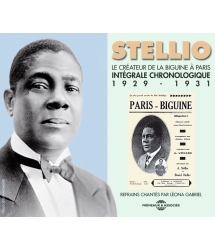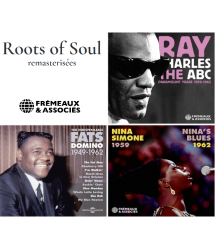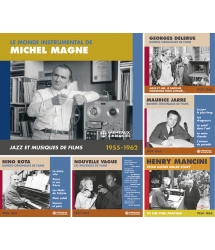The complete recordings in chronological order of Martinique-born clarinettist and bandleader Alexandre Stellio, the first to record the beguine in Paris and whose six titles from his debut session hark back to the sounds of his native island prior to the volcanic explosion of 1902 which killed 30000 people and incidentally wiped out the music scene – Stellio, born in 1885, was already playing music and living in French Guyana at the time. The six titles from the October 1929 debut session for Odéon Records were a lot wilder than anything that came later, with the band line-up of Stellio on clarinet, the amazing Archange Saint-Hilaire on trombone, Ernest Léardée on violon (sometimes making it sound like a banjo!) and Victor Collat on violincello, plus Jeanne Rosillette on vocals. The results of this, what may seem unusual, instrumentation are familiar and strange at the same time, akin to the wilder side of New Orleans jazz – possibly a relative of course, though Stellio certainly did listen to and consciously study jazz records prior to his own debut on wax. The remaining titles are (relatively speaking) more conventional, Saint-Hilaire unfortunately abandoning the line-up before the second session took place a couple of month later, with banjo and drums added, whilst Léardée headed out on his own before the third session in September 1930 with Victor Collat switching to piano. Léona Gabriella recorded six titles in July 1931 with Stellio and band behind her for Polydor, but as she was the band singer and crops up on numerous other titles anyway, these fit right in. The band credit for Stellio´s own next session reflected the success he had enjoyed at the Paris Exposition, whilst Tagada-Buguine was the name of Stellio´s own short-lived nightclub in the French capital. The forty numbers are mostly classic biguines, though there are some mazurkas and two Creole waltzes included (of the latter, “Alberte Et André” hints at the classic “La Vie En Rose”, a hit for Edith Piaf in 1946). For those with a taste for vintage jazz or the music of the eastern Caribbean, this is indispensable. Should you fall into the category, the only reason for not buying this is if Frémeaux come up with a complete Stellio box set running up to his death in 1939.
Norman DARWEN – BLUES & RYTMN
Norman DARWEN – BLUES & RYTMN
Produits associés

Stellio
INTEGRALE CHRONOLOGIQUE 1929-1931
29,99 €
19,95 €










